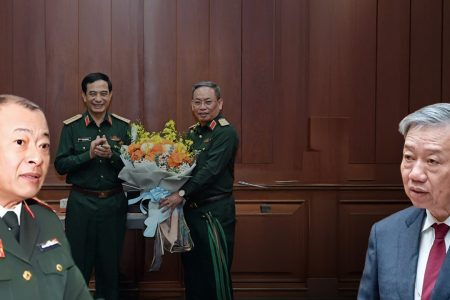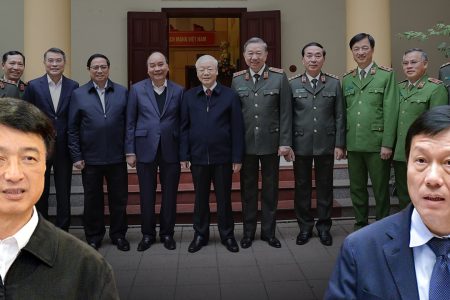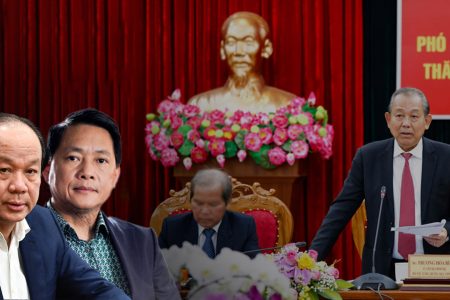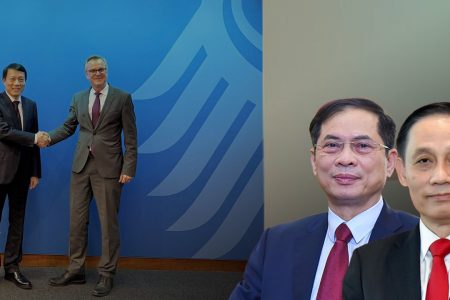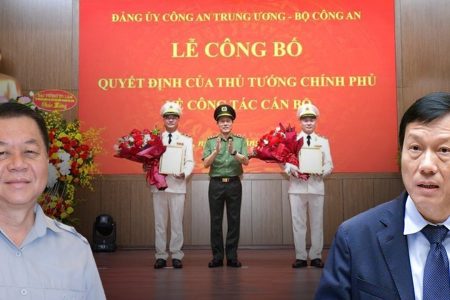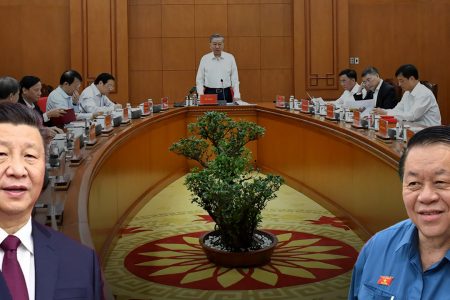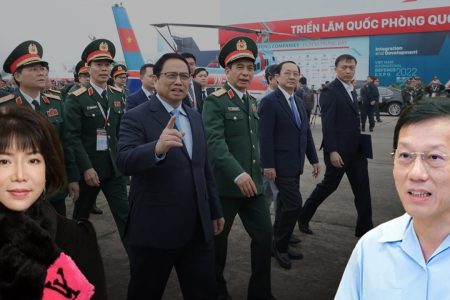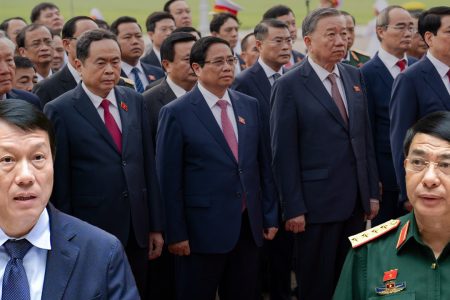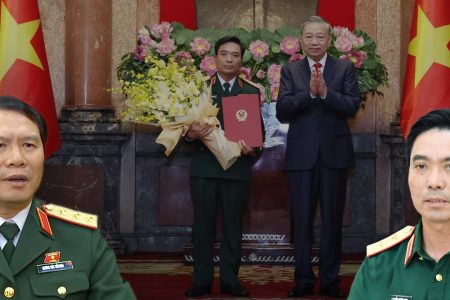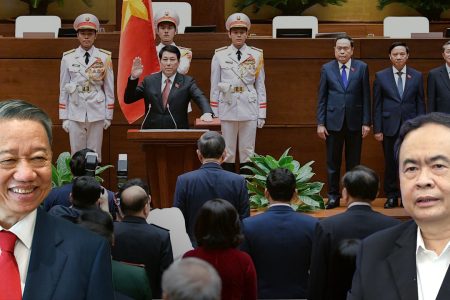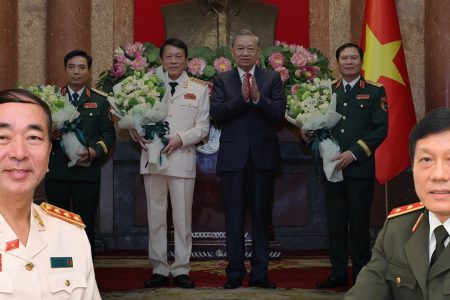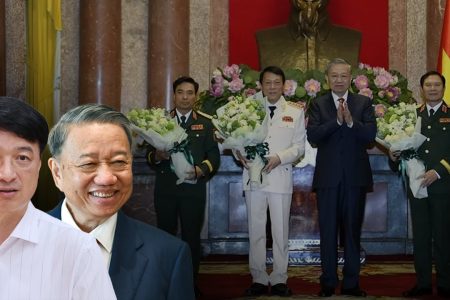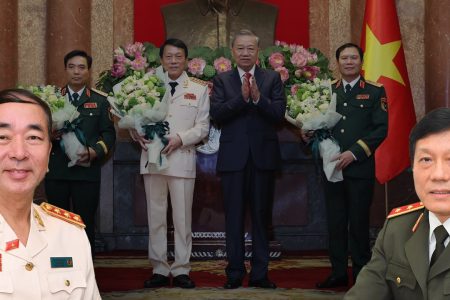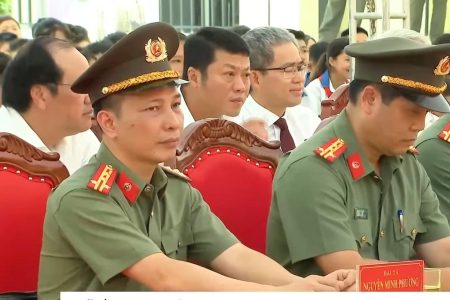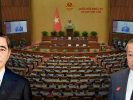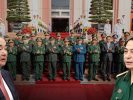Vietnam’s sending a note to reject China’s claim to the East Sea (South China Sea) to the United Nations has created elation among the Vietnamese public in recent days, according to observers.
At the same time, in online forums, public opinion and some experts speculate that the new move shows that within the Vietnamese leadership, the tendency to sue China about maritime boundaries is prevailing, and the faction that is considered to be “pro-China” is weak.
However, two experts knowledgeable in Vietnam and the East Sea say they disagree on the conjecture mentioned above.
“Inside the Vietnamese regime, there will be a group of officials want to be tougher with China, but there are also others who want to be softer, more skillful to deal with China. I think that does not necessarily lead us to label them pro-Chinese or anti-China,” Dr. Le Hong Hiep, a research from Singapore-based ISEA Southeast Asia Research Institute-Yusof Ishak, told VOA.
According to this researcher, regarding the dispute in the East Sea, “almost all” politicians and policy makers in Vietnam have a prudent view and want to protect Vietnam’s interests against the Chinese encroachment, but Vietnamese officials have “not yet agreed” on how to deal with China.
Dr. Hiep added: “Someone want to be more skillful with China so that Vietnam can both protect its interests in the East Sea and not harm the political and economic interests in relations with China. Therefore, I think this causes a perception not entirely from the outside that there are pro-Chinese or anti-Chinese groups within Vietnam. This is not entirely true. The majority in the Vietnamese regime agreed to resist Chinese pressure in the East Sea, but the difference between them is how to achieve that goal.”
Hoang Viet, a researcher in the East Sea, currently working in Ho Chi Minh City, shared the above view, saying: “Vietnam’s political structure requires all collective consensus. There are also groups that appear to be more pro-Chinese or more inclined towards the United States. It seems that it is difficult to divide into clear groups in Vietnam. Vietnam is united from the top to the bottom, and the policy has existed for years.”
Even so, according to Hoang Viet, there is a remarkable movement among decision-making officials in Vietnam. He said: “Through a series of events, there are signs that even Vietnam’s top leaders are shifting their minds, that is, the direction from China has gradually shifted toward the United States and its allies.”
Citing evidence of this point of view, Mr. Viet mentioned the incident when Chinese maritime vessels sunk a Vietnamese fishing vessel on April 2 near the disputed Hoang Sa (Paracels) and the next day, on April 2, People newspaper, the mouthpiece of the ruling Communist Party of Vietnam, published the full statement of protest by the spokesperson of Vietnam’s Ministry of Foreign Affairs.
For comparison, East Sea researcher Hoang Viet reiterated that in the summer-autumn of 2019, when China put a marine survey ship into operation for more than 3 months at Vanguard Bank, causing tremendous tension between Vietnam and China, the People “posted no lines” on that issue.
Hoang Viet said that the sinking of the ship on April 2 was not “random,” but related to Vietnam sending a note to the UN on March 30, which rejected the “historical factors” used for the establishment of China’s maritime sovereignty claim.
“On March 30, the Vietnamese side submitted the note, maybe China responded on two things. One is Vietnam’s attitude toward the United States recently, and the second is to the March 30 note, China responded by sinking fishing vessels,” Hoang Viet said.

According to Hoang Viet, Vietnam’s latest position is consistent with the decision of an international arbitration court in 2016 on the maritime dispute between the Philippines and China, although in a recent note Vietnam did not mention the court’s decision. He said that Vietnam’s clearer, more specific positions on maritime disputes help to establish a stronger basis for Vietnam to use legal instruments in the future.
However, at present, “the situation has not appeared so tense that Vietnam has to sue China,” still according to Mr. Viet.
When Vietnam will use legal instruments is an “open question” and will be “a political decision,” researcher Hiep of ISEA-Yusof Ishak Institute said.
There are many factors that can influence the time Vietnam will choose to sue, in which the political relationship between Vietnam and China is “a decisive factor,” Dr. Hiep said.
As reported, in a note sent to the United Nations in late March, Vietnam objected to the maritime claims mentioned in some Chinese notes sent to the United Nations earlier.
“These claims seriously violate Vietnam’s sovereignty, sovereignty and jurisdiction in the South China Sea,” the Vietnamese note said.
With complex developments in the East Sea in 2020, will the International Arbitration Tribunal for the Law of the Sea be a closer choice of Vietnam?
Through diplomatic note, Vietnam affirmed the UN Convention on the Law of the Sea 1982 (UNCLOS) is the only legal basis, comprehensive and comprehensive regulations on the scope of maritime entitlement between Vietnam and China.
At the same time, Vietnam made its point of view on the features of both the Hoang Sa and the Truong Sa (Spratlys) that “the sea of structures always floating in the two archipelagos must be determined in accordance with the Article 121 (3) of the Convention; island groups in the East Sea, including the two archipelagos, have no baseline drawn by connecting the outermost points of the furthest structures; reefs or floating structures are not territorial beneficiaries and do not have their own seas.”
The current Vietnamese regime, in terms of official statement, barely talks about using legal measures to resolve disputes related to China.
However, from an academic perspective, many seminars held in Vietnam have mentioned that Vietnam needs to study legal procedures for initiating a lawsuit to the International Arbitration Court on the Law of the Sea. in accordance with Annex VII of the 1982 Convention.
Dr. Dinh Hoang Thang raised the issue: “What can Vietnam get to sue China? The first thing is popular. People are very upset because they are not politicians, they do not fully understand the dilemma of the leader. “

“Even if you let the people complain, the leadership will lose its legitimacy. This move may be somewhat reassuring. Another effect of the lawsuit is that the people will be more confident in the government. People understand that, the government will dare to take appropriate actions, once China exceeds the limit.
Not only his people but also his friends, Friends here in the broad sense, strategic sense, not you like the “two-sided conflict“. The world will see the way of Vietnam is clear and transparent, different from the politicians “Judas betraying God” in the ASEAN community.
Taking a lawsuit against China will have the opportunity to clarify the cause. There is a cause, then the opportunity to mobilize international opinion continues to support. Bringing the case to an international tribunal, struggling to reach a peaceful solution, in line with the trend of the times.
Even if there is trouble in relations with China, it is much better to accept an armed conflict.
When choosing a clearer position with China, Vietnam will gain greater support of the civilized world. Vietnam has a chance to escape China’s economic and political influence, something that the clinging to negotiations or the disruption of the war cannot bring about.”
“What about China losing? China will certainly lose more than Vietnam. One of the immediate losses is that China, which has no friends in the world, now with a lawsuit on the East Sea, ASEAN countries, except politicians who have “soaked their money” in China, Dr. Dinh Hoang Thang explain.
“But China’s biggest loss is going to directly affect the Belt and Road Initiative (BRI). Which country would believe China, after Africa and Italy collapsed because of joining BRI? China must know that it is impossible to subdue a country with force or to make a nation to surrender. Therefore, China has to accept to come into the solution.” Dr. Thang said.
Associate Professor Hoang Ngoc Giao said: “As for China, if it is sued, we see through the precedent of the Philippines suing China, after the verdict is made, China is very worried.”
Dr. Tran Cong Truc also agreed that China is very disadvantageous, he said: “For China, of course, when the case is made, the decision is unfavorable for China, the Chinese side will be condemned.
The international community will see clearly China’s absurdity, especially in spite of international law, which is politically, diplomatic and legal, and China is very disadvantageous.
But one thing is that it may not be enforced, because even the verdict is given, the enforcement mechanism is not available and China can also take advantage of its position as a permanent member of the UN Security Council again.”
The case of Vietnam sending a diplomatic note to the UN to protest against China ‘s infringement of sovereignty in the East Sea is a special action, taking place for the first time.
To make this courageous decision, all high-ranking leaders, including the General Secretary, President Nguyen Phu Trong, Prime Minister Nguyen Xuan Phuc and National Assembly Chairman Nguyen Thi Kim Ngan are needed.
But this move is not enough, as China has long claimed that its sovereignty covers almost the entire East Sea through the 9-dash line claim (which Vietnam calls the cow’s tongue line).
Before the devastation of the Covid-19 outbreak, which China is causing to the world terror with over 80,000 deaths and over 1 million people infected, it is necesary to work with the US and democratic countries to eliminate danger from the northern country.
Vietnam should not hesitate, sue China as the Philippines once did and succeeded.
Hai Yen from Hanoi – Thoibao.de (Translated)



